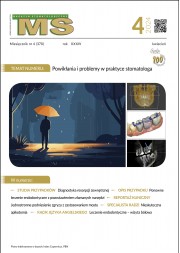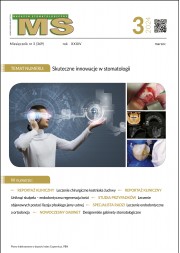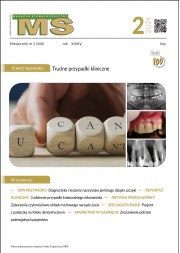Dostęp do tego artykułu jest płatny.
Zapraszamy do zakupu!
Cena: 5.40 PLN (z VAT)
Kup artykuł
Po dokonaniu zakupu artykuł w postaci pliku PDF prześlemy bezpośrednio pod twój adres e-mail.
The latest anticoagulants and dental procedures. Are you receiving anticoagulants? – an important question in the dental office
Autorzy: Marta Podolecka, Tomasz Hildebrandt, Tomasz Podolecki
Autorzy: Marta Podolecka, Tomasz Hildebrandt, Tomasz Podolecki
Streszczenie
Szacuje się, że nawet 5% pacjentów zgłaszających się do gabinetu stomatologicznego przyjmuje co najmniej jeden lek przeciwzakrzepowy. Leki przeciwzakrzepowe nie stanowią jednolitej grupy medykamentów, należą bowiem do nich zarówno leki antyagregacyjne, jak i przeciwkrzepliwe, a na rynku pojawiają się coraz to nowsze preparaty, np. dabigatran, riwaroksaban. Leki te różnią się między sobą nie tylko mechanizmem działania, ale również czasem i siłą działania przeciwzakrzepowego. Z powodu zwiększonego ryzyka powikłań krwotocznych, związanych ze stosowaniem terapii przeciwzakrzepowej, stomatolodzy powinni zwrócić szczególną uwagę na dokładne zebranie wywiadu, który musi być nieodłączną częścią wizyty w gabinecie stomatologicznym, a w szczególności musi poprzedzać każdą interwencję chirurgiczną.
Hasła indeksowe: leczenie przeciwzakrzepowe, zabiegi stomatologiczne, riwaroksaban, dabigatran
Hasła indeksowe: leczenie przeciwzakrzepowe, zabiegi stomatologiczne, riwaroksaban, dabigatran
Summary
It is estimated that up to 5% of patients attending the dental office are receiving at least one anticoagulant. Anticoagulants do not form a uniform group of medicaments. To them belong both anti-aggregating and anticoagulant medicaments and ever newer preparations such as dabigatran and riwaroksabam are appearing on the market. These medicines differ between themselves not only by the mechanism of action but also by the time and strength of anticoagulant action. Due to the greater risk of complications of haemorrhage connected with the use of anticoagulant therapy, dentists should pay particular attention to careful history taking that must be an inseparable part of the visit to the dental office, and, in particular, must precede each surgical intervation.
Key words: antithrombotic therapy, dental procedures, rivaroxaban, dabigatran













